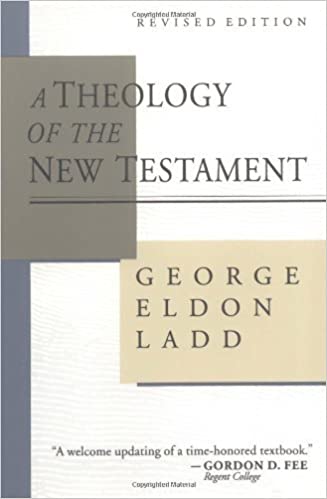A Brief Book Summary from Books At a Glance
By Steve West
About the Author
George Ladd (1911-1982) was Professor of New Testament Exegesis and Theology at Fuller Theological Seminary, Pasadena, California. He wrote many books which were highly influential.
Introduction
Ladd’s A Theology of the New Testament is a classic reference work for NT studies. He works through the major NT corpuses, expounding their theological contributions and emphases. Ladd is conservative and evangelical, but sensitive to the contributions responsible criticism can play. This book has served as a major and valuable contribution to the field for years.
Table of Contents
- Introduction
I: The Synoptic Gospels
- John the Baptist
- The Need of the Kingdom
- The Kingdom of God
- The New Age of Salvation
- The God of the Kingdom
- The Mystery of the Kingdom
- The Kingdom and the Church
- The Ethics of the Kingdom
- The Messiah
- The Son of Man
- The Son of God
- The Messianic Problem
- The Messianic Mission
- Eschatology
- Matthew, Mark, and Luke (R. T. France)
II: The Fourth Gospel
- The Critical Problem
- The Johannine Dualism
- Christology
- Eternal Life
- The Christian Life
- The Holy Spirit
- Eschatology
III: The Primitive Church
- The Critical Problem
- The Resurrection of Jesus
- The Eschatological Kerygma
- The Church
IV: Paul
- Introduction
- Sources of Paul’s Thought
- Humanity outside of Christ
- The Person of Christ
- The Work of Christ: Atonement
- The Work of Christ: Justification
- The Pauline Psychology
- The New Life in Christ
- The Law
- The Christian Life
- The Church
- Eschatology
V: Hebrews and the General Epistles
- Hebrews
- James
- 1 Peter
- 2 Peter and Jude
- Johannine Epistles
VI: The Apocalypse
- The Apocalypse
- Appendix: Unity and Diversity in the New Testament (David Wenham)
Summary of Parts III – IV
Part III: The Primitive Church
Since the Book of Acts purports to give us a history of the growth, experience, and preaching of the early church, it is essential to know if it is accurate. Many liberal scholars were highly skeptical of Luke’s historical accuracy, but research has helped to establish the trustworthiness of Luke’s material. There is no reason to think that the recorded sermons are not faithful summaries of what was preached. All historical reporting is selective and interpretive. Luke does not write history in a contemporary sense, but he is an accurate first-century historian.
At first, the crucifixion of Jesus destroyed the hopes of the disciples that he was the Messiah and that the Kingdom was about to dawn. Something happened, though, that totally transformed them a few days later. They claimed that Jesus was raised from the dead. It was the resurrection that they bore witness to, and it was the center of their message. God’s program of salvation led up to the cross and resurrection. Without the resurrection, faith was said to be futile. The resurrection is a miracle, and the Scriptures record it as an objective fact.
A good historical case can be made to counter skepticism and to establish that the resurrection actually occurred. Alternative explanations for all of the data fail to be persuasive and leave more questions than answers. The resurrection is what propelled the life and growth of the church. It was not an existential, religious, or spiritual event alone: it was a physical event where Jesus was bodily raised. It was not merely a reviving of a corpse, but the entering into of glorified life. Eschatology broke into space-time history in the resurrection. Jesus’ resurrection body was physical, but it belonged to the Age to Come.
Acts contains the earliest interpretation of the life and work of Jesus. It focused on Jesus’ death, resurrection, and exaltation. His death is seen as an atonement for sin, which was part of the redemptive plan of God. Jesus acts as the Servant and Messiah. “Christ” becomes a prominent title. In the resurrection, unexpectedly the future age broke into the present. The phrase “the Kingdom of God” is not nearly as prominent in Acts as it was in the Synoptics, but the idea of the Kingdom in the present and in its future consummation is not absent. In the ascension, Jesus is exalted in glory to the right hand of the Father.
[To continue reading this summary, please see below....]The remainder of this article is premium content. Become a member to continue reading.
Already have an account? Sign In
